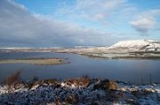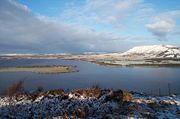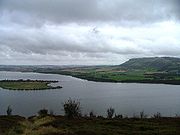
St Serf's Inch
Encyclopedia
St Serf's Inch or St Serf's Island is an island in Loch Leven
, in south-eastern Perth and Kinross
, Scotland
. It was the home of a Culdee
and then an Augustinian monastic community, St Serf's Inch Priory
.
 There was a monastic community on the island which was old in the 12th century. The monastery produced a series of Gaelic language charters from the 11th and 12th centuries which were translated into Latin in the late 12th century. It is from these that we know Macbeth
There was a monastic community on the island which was old in the 12th century. The monastery produced a series of Gaelic language charters from the 11th and 12th centuries which were translated into Latin in the late 12th century. It is from these that we know Macbeth
, the King of Scots and his consort Gruoch
, made an endowment of land to the priory. One of the these charters purports to go back to Brude filius Dergard, that is Bruide mac Dargarto
, King of the Picts (d. 706). Other of these charters record grants from Máel Dúin
, Bishop of St Andrews (d. 1055), his successor Túathal
(d. c. 1060), his successor Fothad mac Maíl Míchéil
, King Máel Coluim III
(1058–1093) and his wife Margaret
, Ethelred
, abbot of Dunkeld, and King Domnall Bán
(1093-1097). Also among the collection of these translations is a record of a trial held c. 1128 and presided over by Causantín
, Mormaer of Fife and magnum judex in Scotia, assisted by Dufgal filium Mocche and Meildoineneth filium Machedath; the trial pertained to the behaviour of one Robert "the Burgundian", the earliest recorded French settler north of the Forth, towards the monks of St Serf, and resulted in favour of the monks after Causantín bowed to the "superior knowledge" of the law held by "Dufgal".
 Prior Andrew of Wyntoun
Prior Andrew of Wyntoun
, author of the 15th century historical work called Oryginalle Cronykil of Scotland included various unflattering stories about his monarch. Macbeth was described as a 'changeling' or 'Devil's child'. Andrew also recorded a number of tales that re-appeared four centuries later in William Shakespeare
's 'Scottish Play'
including a prophecy that Macbeth would never be killed by a man born of woman, his recognition by three 'Weird Sisters', and that his demise would only come when the wood of Birnam
came to Dunsinane.
Loch Leven
Loch Leven is a fresh water loch in Perth and Kinross council area, central Scotland.Roughly triangular, the loch is about 6 km at its longest. The burgh of Kinross lies at its western end. Loch Leven Castle lies on an island a short way offshore...
, in south-eastern Perth and Kinross
Perth and Kinross
Perth and Kinross is one of 32 council areas in Scotland, and a Lieutenancy Area. It borders onto the Aberdeenshire, Angus, Dundee City, Fife, Clackmannanshire, Stirling, Argyll and Bute and Highland council areas. Perth is the administrative centre...
, Scotland
Scotland
Scotland is a country that is part of the United Kingdom. Occupying the northern third of the island of Great Britain, it shares a border with England to the south and is bounded by the North Sea to the east, the Atlantic Ocean to the north and west, and the North Channel and Irish Sea to the...
. It was the home of a Culdee
Culdee
Céli Dé or Culdees were originally members of ascetic Christian monastic and eremitical communities of Ireland, Scotland and England in the Middle Ages. The term is used of St. John the Apostle, of a missioner from abroad recorded in the Annals of the Four Masters at the year 806, and of Óengus...
and then an Augustinian monastic community, St Serf's Inch Priory
St Serf's Inch Priory
The St Serf's Inch Priory was a community of Augustinian canons based, initially at least, on St Serf's Inch in Loch Leven.It was founded from St Andrews Cathedral Priory at the instigation of King David I of Scotland in 1150...
.
History

Macbeth of Scotland
Mac Bethad mac Findlaích was King of the Scots from 1040 until his death...
, the King of Scots and his consort Gruoch
Gruoch of Scotland
Gruoch ingen Boite was the daughter of Boite mac Cináeda son of Cináed III. She is most famous for being the wife and queen of Mac Bethad mac Findlaích . The dates of her life are not certainly known....
, made an endowment of land to the priory. One of the these charters purports to go back to Brude filius Dergard, that is Bruide mac Dargarto
Bridei IV of the Picts
Bruide mac Der-Ilei was king of the Picts. He became king when Taran was deposed in 697.He was the brother of his successor Nechtan. It has been suggested that Bruide's father was Dargart mac Finguine of the Cenél Comgaill, a kingroup in Dál Riata who controlled Cowal and the Isle of Bute...
, King of the Picts (d. 706). Other of these charters record grants from Máel Dúin
Máel Dúin of Cennrígmonaid
Máel Dúin is the eighth alleged Bishop of St Andrews . He is mentioned in the bishop-lists of the 15th-century historians Walter Bower and Andrew of Wyntoun as the successor of Bishop Ailín....
, Bishop of St Andrews (d. 1055), his successor Túathal
Túathal of Cennrígmonaid
Túathal is the ninth alleged Bishop of St Andrews. He is mentioned in the bishop-list of the later medieval historian Walter Bower as the successor of Bishop Máel Dúin. Túathal's name, like his immediate predecessor Máel Dúin's, is known from other sources. A charter preserved in the Registrum of...
(d. c. 1060), his successor Fothad mac Maíl Míchéil
Fothad II of Cennrígmonaid
Fothad II was the bishop of St Andrews for most of the reign of King Máel Coluim III mac Donnchada . Alternative spellings include Fodhoch, Fothach and Foderoch, and Fothawch . A "Modach filius Malmykel" is mentioned in a grant, dated 1093, as the bishop of S. Andrews...
, King Máel Coluim III
Malcolm III of Scotland
Máel Coluim mac Donnchada , was King of Scots...
(1058–1093) and his wife Margaret
Saint Margaret of Scotland
Saint Margaret of Scotland , also known as Margaret of Wessex and Queen Margaret of Scotland, was an English princess of the House of Wessex. Born in exile in Hungary, she was the sister of Edgar Ætheling, the short-ruling and uncrowned Anglo-Saxon King of England...
, Ethelred
Ethelred of Scotland
Ethelred was the son of King Máel Coluim III and his wife Margaret, the third oldest of the latter and the probable sixth oldest of the former. He took his name, almost certainly, from Margaret's great-grandfather King Æþelræd Unræd, or Ethelred the Unready...
, abbot of Dunkeld, and King Domnall Bán
Donald III of Scotland
Domnall mac Donnchada , anglicised as Donald III, and nicknamed Domnall Bán, "Donald the Fair" , was King of Scots from 1093–1094 and 1094–1097...
(1093-1097). Also among the collection of these translations is a record of a trial held c. 1128 and presided over by Causantín
Causantín, Earl of Fife
Causantín of Fife is the first man we know for certain to have been Mormaer of Fife. Causantín's floruit can be placed between 1095 and 1128. Very little is known about his life and reign as Mormaer of Fife. His father, for instance, is not known by name...
, Mormaer of Fife and magnum judex in Scotia, assisted by Dufgal filium Mocche and Meildoineneth filium Machedath; the trial pertained to the behaviour of one Robert "the Burgundian", the earliest recorded French settler north of the Forth, towards the monks of St Serf, and resulted in favour of the monks after Causantín bowed to the "superior knowledge" of the law held by "Dufgal".

Andrew of Wyntoun
Andrew Wyntoun, known as Andrew of Wyntoun was a Scottish poet, a canon and prior of Loch Leven on St Serf's Inch and later, a canon of St...
, author of the 15th century historical work called Oryginalle Cronykil of Scotland included various unflattering stories about his monarch. Macbeth was described as a 'changeling' or 'Devil's child'. Andrew also recorded a number of tales that re-appeared four centuries later in William Shakespeare
William Shakespeare
William Shakespeare was an English poet and playwright, widely regarded as the greatest writer in the English language and the world's pre-eminent dramatist. He is often called England's national poet and the "Bard of Avon"...
's 'Scottish Play'
Macbeth
The Tragedy of Macbeth is a play by William Shakespeare about a regicide and its aftermath. It is Shakespeare's shortest tragedy and is believed to have been written sometime between 1603 and 1607...
including a prophecy that Macbeth would never be killed by a man born of woman, his recognition by three 'Weird Sisters', and that his demise would only come when the wood of Birnam
Birnam, Perth and Kinross
Birnam is a town in Perthshire, Scotland. The town originated from the Victorian era with the coming of the railway in 1856, although the place and name is well known because William Shakespeare mentioned Birnam Wood in Macbeth.-Location:...
came to Dunsinane.

